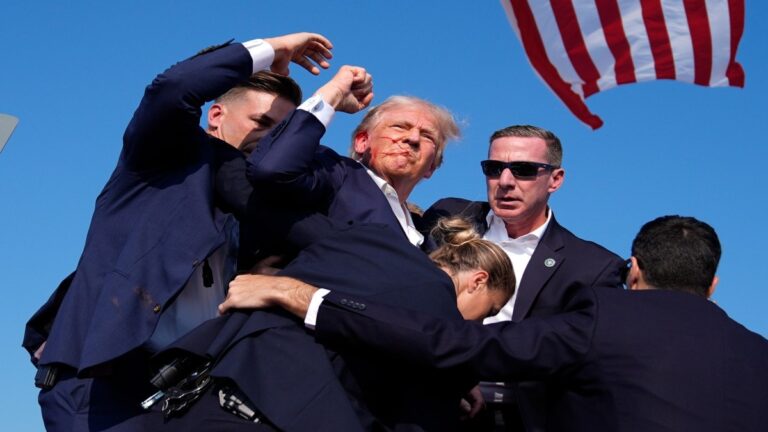Republican presidential candidate and former president Donald Trump is surrounded by U.S. Secret Service agents during a campaign rally in Butler, Pennsylvania, Saturday, July 13, 2024. The Associated Press
Donald Trump, the Republican candidate running for the third US presidency, survived an assassination attempt at a campaign rally in Pennsylvania on Saturday. Trump was hurried off the stage as gunfire rang out in the auditorium. Bleeding from a wound in his ear, Trump pumped his fist into the crowd before being removed by security, a symbol of his determination to his supporters to win the November election.
Trump is safe from the injuries he sustained on Saturday and is not in any danger of dying, but it is unclear how the incident will affect his campaign. His popularity could receive a major boost given global historical precedent: Assassination attempts against populist leaders often send public support soaring, turning them into symbols of resilience and defiance.
What has the reaction been like in the US?
A shooting at a rally for former U.S. President Donald Trump on Saturday
Increase your chances of winning
Reuters, citing investors, reported that betting on Trump’s victory is likely to increase this week as he takes office from the White House.
Shortly after the shooting, billionaire hedge fund manager Bill Ackman endorsed Trump, as did billionaire Elon Musk, calling him a “hardliner” on his social media platform, X.
“The election is likely to be a landslide victory, which will reduce uncertainty,” Reuters quoted Nick Ferres, chief investment officer at Vantage Point Asset Management, as saying, pointing to a similar surge in support for President Ronald Reagan after the 1981 assassination attempt.
Clues from around the world
Global history is filled with examples of leaders whose popularity soared after assassination attempts. Former Pakistani Prime Minister Imran Khan saw his popularity soar after he was shot in the leg at a political rally. People came to see him as a lone warrior fighting a corrupt system. He campaigned to give Pakistanis new hope to revive the country’s fortunes.
Similarly, Brazilian leader Jair Bolsonaro was stabbed to death during an event in 2018. The attack bolstered his image among voters and led to a major victory in the ensuing elections. Bolsonaro’s supporters saw him as a survivor of an assassination attempt by ideological enemies.
In India, the Indian National Congress (INC) won the country’s largest electoral vote in the 1984 national elections, which were held in the shadow of the assassination of Indira Gandhi, who was shot multiple times by two of her bodyguards. More than six years later, her son Rajiv Gandhi was assassinated during the 1991 election campaign, in which the struggling INC returned to power, although it failed to secure a majority in the lower house of parliament.
A uniquely American historical melody
In the United States, President Ronald Reagan is said to have benefited from public sympathy following an assassination attempt on him in 1981, just two months after taking office. This surge of support allowed Reagan to push through a series of controversial economic policies that would shape the country’s future for decades. Many analysts believe the assassination attempt helped him win a second consecutive term as president in the 1984 presidential election.
These examples suggest that assassination attempts can increase a leader’s popularity, but the United States has a more nuanced history on this point. In 1912, former President Theodore Roosevelt, seeking a second nonconsecutive term as the Bull Moose candidate, survived an assassination attempt in Milwaukee. New York saloonkeeper John Schrank shot Roosevelt, but the bullet was cushioned by a thick copy of his speeches and a metal eyeglass case that he had in his breast pocket.
Despite his injuries, Roosevelt insisted on speaking and brushed off pleas for immediate medical attention, showing a level of defiance far more astonishing than that of Trump.
“I don’t know if you all fully understand that I’ve just been shot,” he told the audience, “but it takes more force than that to kill a bull moose.” Roosevelt won great sympathy and respect for his bravery, but he lost the election.
Republican leader Gerald Ford also failed to win a second consecutive term as president after surviving an assassination attempt in 1975. He lost the 1976 election to Democrat Jimmy Carter in a tough battle both within his party and in the general election.
Trump’s path forward
It remains to be seen how Saturday’s shooting will impact Donald Trump’s campaign. History suggests that such incidents can evoke public sympathy and reinforce a leader’s image as resilient. But the ultimate impact on the election will depend on a variety of factors, including how the incident is perceived by voters and how the Trump campaign uses it to its advantage.
As the US approaches the election, the story of Trump’s defiance in the face of danger could play a key role in shaping voter sentiment. Time will tell whether this incident guarantees Trump a path back to the White House or simply adds another dramatic chapter to his checkered political career.
Find us on YouTube
subscribe

